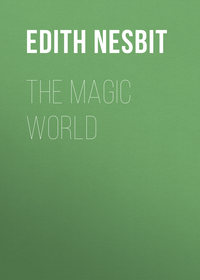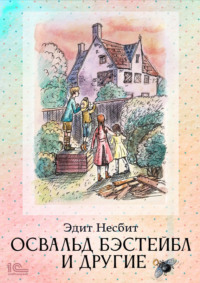 полная версия
полная версияMan and Maid
Then again there was silence. And then the door opened with a soft, silent suddenness, and I saw in the doorway a figure in trailing white. Its eyes blazed in a death-white face. It made two ghostly, gliding steps forward, and my heart stood still. I had not thought it possible for a man to experience so sharp a pang of sheer terror. I had masqueraded as one of the ghosts in this accursed house. Well, the other ghost – the real one – had come to meet me. I do not like to dwell on that moment. The only thing which it pleases me to remember is that I did not scream or go mad. I think I stood on the verge of both.
The ghost, I say, took two steps forward; then it threw up its arms, the lighted taper it carried fell on the floor, and it reeled back against the door with its arms across its face.
The fall of the candle woke me as from a nightmare. It fell solidly, and rolled away under the table.
I perceived that my ghost was human. I cried incoherently: “Don’t, for Heaven’s sake – it’s all right.”
The ghost dropped its hands and turned agonised eyes on me. I tore off my cloak and hat.
“I – didn’t – scream,” she said, and with that I sprang forward and caught her in my arms – my poor, pink lady – white now as a white rose.
I carried her into the powdering-room, and left one candle with her, extinguishing the others hastily, for now I saw what in my extravagant folly had escaped me before, that my ghost exhibition might bring the whole village down on the house. I tore down the long corridor and double locked the doors leading from it to the staircase, then back to the powdering-room and the prone white rose. How, in the madness of that night’s folly, I had thought to bring a brandy-flask passes my understanding. But I had done it. Now I rubbed her hands with the spirit. I rubbed her temples, I tried to force it between her lips, and at last she sighed and opened her eyes.
“Oh – thank God – thank God!” I cried, for indeed I had almost feared that my mad trick had killed her. “Are you better? oh, poor little lady, are you better?”
She moved her head a little on my arm.
Again she sighed, and her eyes closed. I gave her more brandy. She took it, choked, raised herself against my shoulder.
“I’m all right now,” she said faintly. “It served me right. How silly it all is!” Then she began to laugh, and then she began to cry.
It was at this moment that we heard voices on the terrace below. She clutched at my arm in a frenzy of terror, the bright tears glistening on her cheeks.
“Oh! not any more, not any more,” she cried. “I can’t bear it.”
“Hush,” I said, taking her hands strongly in mine. “I’ve played the fool; so have you. We must play the man now. The people in the village have seen the lights – that’s all. They think we’re burglars. They can’t get in. Keep quiet, and they’ll go away.”
But when they did go away they left the local constable on guard. He kept guard like a man till daylight began to creep over the hill, and then he crawled into the hayloft and fell asleep, small blame to him.
But through those long hours I sat beside her and held her hand. At first she clung to me as a frightened child clings, and her tears were the prettiest, saddest things to see. As we grew calmer we talked.
“I did it to frighten my cousin,” I owned. “I meant to have told you to-day, I mean yesterday, only you went away. I am Lawrence Sefton, and the place is to go either to me or to my cousin Selwyn. And I wanted to frighten him off it. But you, why did you – ?”
Even then I couldn’t see. She looked at me.
“I don’t know how I ever could have thought I was brave enough to do it, but I did want the house so, and I wanted to frighten you – ”
“To frighten me. Why?”
“Because I am your cousin Selwyn,” she said, hiding her face in her hands.
“And you knew me?” I asked.
“By your ring,” she said. “I saw your father wear it when I was a little girl. Can’t we get back to the inn now?”
“Not unless you want every one to know how silly we have been.”
“I wish you’d forgive me,” she said when we had talked awhile, and she had even laughed at the description of the pallid young man on whom I had bestowed, in my mind, her name.
“The wrong is mutual,” I said; “we will exchange forgivenesses.”
“Oh, but it isn’t,” she said eagerly. “Because I knew it was you, and you didn’t know it was me: you wouldn’t have tried to frighten me.”
“You know I wouldn’t.” My voice was tenderer than I meant it to be.
She was silent.
“And who is to have the house?” she said.
“Why you, of course.”
“I never will.”
“Why?”
“Oh, because!”
“Can’t we put off the decision?” I asked.
“Impossible. We must decide to-morrow – to-day I mean.”
“Well, when we meet to-morrow – I mean to-day – with lawyers and chaperones and mothers and relations, give me one word alone with you.”
“Yes,” she answered, with docility.
“Do you know,” she said presently, “I can never respect myself again? To undertake a thing like that, and then be so horribly frightened. Oh! I thought you really were the other ghost.”
“I will tell you a secret,” said I. “I thought you were, and I was much more frightened than you.”
“Oh well,” she said, leaning against my shoulder as a tired child might have done, “if you were frightened too, Cousin Lawrence, I don’t mind so very, very much.”
It was soon afterwards that, cautiously looking out of the parlour window for the twentieth time, I had the happiness of seeing the local policeman disappear into the stable rubbing his eyes.
We got out of the window on the other side of the house, and went back to the inn across the dewy park. The French window of the sitting-room which had let her out let us both in. No one was stirring, so no one save she and I were any the wiser as to that night’s work.
It was like a garden party next day, when lawyers and executors and aunts and relations met on the terrace in front of Sefton Manor House.
Her eyes were downcast. She followed her Aunt demurely over the house and the grounds.
“Your decision,” said my great-uncle’s solicitor, “has to be given within the hour.”
“My cousin and I will announce it within that time,” I said and I at once gave her my arm.
Arrived at the sundial we stopped.
“This is my proposal,” I said: “we will say that we decide that the house is yours – we will spend the £20,000 in restoring it and the grounds. By the time that’s done we can decide who is to have it.”
“But how?”
“Oh, we’ll draw lots, or toss a halfpenny, or anything you like.”
“I’d rather decide now,” she said; “you take it.”
“No, you shall.”
“I’d rather you had it. I – I don’t feel so greedy as I did yesterday,” she said.
“Neither do I. Or at any rate not in the same way.”
“Do – do take the house,” she said very earnestly.
Then I said: “My cousin Selwyn, unless you take the house, I shall make you an offer of marriage.”
“Oh!” she breathed.
“And when you have declined it, on the very proper ground of our too slight acquaintance, I will take my turn at declining. I will decline the house. Then, if you are obdurate, it will become an asylum. Don’t be obdurate. Pretend to take the house and – ”
She looked at me rather piteously.
“Very well,” she said, “I will pretend to take the house, and when it is restored – ”
“We’ll spin the penny.”
So before the waiting relations the house was adjudged to my cousin Selwyn. When the restoration was complete I met Selwyn at the sundial. We had met there often in the course of the restoration, in which business we both took an extravagant interest.
“Now,” I said, “we’ll spin the penny. Heads you take the house, tails it comes to me.”
I spun the coin – it fell on the brick steps of the sundial, and stuck upright there, wedged between two bricks. She laughed; I laughed.
“It’s not my house,” I said.
“It’s not my house,” said she.
“Dear,” said I, and we were neither of us laughing then, “can’t it be our house?”
And, thank God, our house it is.
II
THE POWER OF DARKNESS
It was an enthusiastic send-off. Half the students from her Atelier were there, and twice as many more from other studios. She had been the belle of the Artists’ Quarter in Montparnasse for three golden months. Now she was off to the Riviera to meet her people, and every one she knew was at the Gare de Lyons to catch the pretty last glimpse of her. And, as had been more than once said late of an evening, “to see her was to love her.” She was one of those agitating blondes, with the naturally rippled hair, the rounded rose-leaf cheeks, the large violet-blue eyes that look all things and mean Heaven alone knows how little. She held her court like a queen, leaning out of the carriage window and receiving bouquets, books, journals, long last words, and last longing looks. All eyes were on her, and her eyes were for all – and her smile. For all but one, that is. Not a single glance went Edward’s way, and Edward, tall, lean, gaunt, with big eyes, straight nose, and mouth somewhat too small, too beautiful, seemed to grow thinner and paler before one’s eyes. One pair of eyes at least saw the miracle worked, the paling of what had seemed absolute pallor, the revelation of the bones of a face that seemed already covered but by the thinnest possible veil of flesh.
And the man whose eyes saw this rejoiced, for he loved her, like the rest, or not like the rest; and he had had Edward’s face before him for the last month, in that secret shrine where we set the loved and the hated, the shrine that is lighted by a million lamps kindled at the soul’s flame, the shrine that leaps into dazzling glow when the candles are out and one lies alone on hot pillows to outface the night and the light as best one may.
“Oh, good-bye, good-bye, all of you,” said Rose. “I shall miss you – oh, you don’t know how I shall miss you all!”
She gathered the glances of her friends and her worshippers on her own glance, as one gathers jewels on a silken string. The eyes of Edward alone seemed to escape her.
“Em voiture, messieurs et dames.”
Folk drew back from the train. There was a whistle. And then at the very last little moment of all, as the train pulled itself together for the start, her eyes met Edward’s eyes. And the other man saw the meeting, and he knew – which was more than Edward did.
So, when the light of life having been borne away in the retreating train, the broken-hearted group dispersed, the other man, whose name by the way was Vincent, linked his arm in Edward’s and asked cheerily: “Whither away, sweet nymph?”
“I’m off home,” said Edward. “The 7.20 to Calais.”
“Sick of Paris?”
“One has to see one’s people sometimes, don’t you know, hang it all!” was Edward’s way of expressing the longing that tore him for the old house among the brown woods of Kent.
“No attraction here now, eh?”
“The chief attraction has gone, certainly,” Edward made himself say.
“But there are as good fish in the sea – ?”
“Fishing isn’t my trade,” said Edward.
“The beautiful Rose! – ” said Vincent.
Edward raised hurriedly the only shield he could find. It happened to be the truth as he saw it.
“Oh,” he said, “of course, we’re all in love with her – and all hopelessly.”
Vincent perceived that this was truth, as Edward saw it.
“What are you going to do till your train goes?” he asked.
“I don’t know. Café, I suppose, and a vilely early dinner.”
“Let’s look in at the Musée Grévin,” said Vincent.
The two were friends. They had been school-fellows, and this is a link that survives many a strain too strong to be resisted by more intimate and vital bonds. And they were fellow-students, though that counts for little or much – as you take it. Besides, Vincent knew something about Edward that no one else of their age and standing even guessed. He knew that Edward was afraid of the dark, and why. He had found it out that Christmas that the two had spent at an English country house. The house was full: there was a dance. There were to be theatricals. Early in the new year the hostess meant to “move house” to an old convent, built in Tudor times, a beautiful place with terraces and clipped yew trees, castellated battlements, a moat, swans, and a ghost story.
“You boys,” she said, “must put up with a shake-down in the new house. I hope the ghost won’t worry you. She’s a nun with a bunch of keys and no eyes. Comes and breathes softly on the back of your neck when you’re shaving. Then you see her in the glass, and, as often as not, you cut your throat.” She laughed. So did Edward and Vincent, and the other young men; there were seven or eight of them.
But that night, when sparse candles had lighted “the boys” to their rooms, when the last pipe had been smoked, the last good-night said, there came a fumbling with the handle of Vincent’s door. Edward entered an unwieldy figure clasping pillows, trailing blankets.
“What the deuce?” queried Vincent in natural amazement.
“I’ll turn in here on the floor, if you don’t mind,” said Edward. “I know it’s beastly rot, but I can’t stand it. The room they’ve put me into, it’s an attic as big as a barn – and there’s a great door at the end, eight feet high – raw oak it is – and it leads into a sort of horror-hole – bare beams and rafters, and black as Hell. I know I’m an abject duffer, but there it is – I can’t face it.”
Vincent was sympathetic, though he had never known a night-terror that could not be exorcised by pipe, book, and candle.
“I know, old chap. There’s no reasoning about these things,” said he, and so on.
“You can’t despise me more than I despise myself,” Edward said. “I feel a crawling hound. But it is so. I had a scare when I was a kid, and it seems to have left a sort of brand on me. I’m branded ‘coward,’ old man, and the feel of it’s not nice.”
Again Vincent was sympathetic, and the poor little tale came out. How Edward, eight years old, and greedy as became his little years, had sneaked down, night-clad, to pick among the outcomings of a dinner-party, and how, in the hall, dark with the light of an “artistic” coloured glass lantern, a white figure had suddenly faced him – leaned towards him it seemed, pointed lead-white hands at his heart. That next day, finding him weak from his fainting fit, had shown the horror to be but a statue, a new purchase of his father’s, had mattered not one whit.
Edward had shared Vincent’s room, and Vincent, alone of all men, shared Edward’s secret.
And now, in Paris, Rose speeding away towards Cannes, Vincent said: “Let’s look in at the Musée Grévin.”
The Musée Grévin is a wax-work show. Your mind, at the word, flies instantly to the excellent exhibition founded by the worthy Madame Tussaud, and you think you know what wax-works mean. But you are wrong. The exhibition of Madame Tussaud – in these days, at any rate – is the work of bourgeois for a bourgeois class. The Musée Grévin contains the work of artists for a nation of artists. Wax, modelled and retouched till it seems as near life as death is: this is what one sees at the Musée Grévin.
“Let’s look in at the Musée Grévin,” said Vincent. He remembered the pleasant thrill the Musée had given him, and wondered what sort of a thrill it would give his friend.
“I hate museums,” said Edward.
“This isn’t a museum,” Vincent said, and truly; “it’s just wax-works.”
“All right,” said Edward indifferently. And they went. They reached the doors of the Musée in the grey-brown dusk of a February evening.
One walks along a bare, narrow corridor, much like the entrance to the stalls of the Standard Theatre, and such daylight as there may be fades away behind one, and one finds oneself in a square hall, heavily decorated, and displaying with its electric lights Loie Fuller in her accordion-pleated skirts, and one or two other figures not designed to quicken the pulse.
“It’s very like Madame Tussaud’s,” said Edward.
“Yes,” Vincent said; “isn’t it?”
Then they passed through an arch, and behold, a long room with waxen groups life-like behind glass – the coulisses of the Opéra, Kitchener at Fashoda – this last with a desert background lit by something convincingly like desert sunlight.
“By Jove!” said Edward, “that’s jolly good.”
“Yes,” said Vincent again; “isn’t it?”
Edward’s interest grew. The things were so convincing, so very nearly alive. Given the right angle, their glass eyes met one’s own, and seemed to exchange with one meaning glances.
Vincent led the way to an arched door labelled: “Gallerie de la Revolution.”
There one saw, almost in the living, suffering body, poor Marie Antoinette in prison in the Temple, her little son on his couch of rags, the rats eating from his platter, the brutal Simon calling to him from the grated window; one almost heard the words, “Ho la, little Capet – are you asleep?”
One saw Marat bleeding in his bath – the brave Charlotte eyeing him – the very tiles of the bath-room, the glass of the windows with, outside, the very sunlight, as it seemed, of 1793 on that “yellow July evening, the thirteenth of the month.”
The spectators did not move in a public place among wax-work figures. They peeped through open doors into rooms where history seemed to be re-lived. The rooms were lighted each by its own sun, or lamp, or candle. The spectators walked among shadows that might have oppressed a nervous person.
“Fine, eh?” said Vincent.
“Yes,” said Edward; “it’s wonderful.”
A turn of a corner brought them to a room. Marie Antoinette fainting, supported by her ladies; poor fat Louis by the window looking literally sick.
“What’s the matter with them all?” said Edward.
“Look at the window,” said Vincent.
There was a window to the room. Outside was sunshine – the sunshine of 1792 – and, gleaming in it, blonde hair flowing, red mouth half open, what seemed the just-severed head of a beautiful woman. It was raised on a pike, so that it seemed to be looking in at the window.
“I say!” said Edward, and the head on the pike seemed to sway before his eyes.
“Madame de Lamballe. Good thing, isn’t it?” said Vincent.
“It’s altogether too much of a good thing,” said Edward. “Look here – I’ve had enough of this.”
“Oh, you must just see the Catacombs,” said Vincent; “nothing bloody, you know. Only Early Christians being married and baptized, and all that.”
He led the way, down some clumsy steps to the cellars which the genius of a great artist has transformed into the exact semblance of the old Catacombs at Rome. The same rough hewing of rock, the same sacred tokens engraved strongly and simply; and among the arches of these subterranean burrowings the life of the Early Christians, their sacraments, their joys, their sorrows – all expressed in groups of wax-work as like life as Death is.
“But this is very fine, you know,” said Edward, getting his breath again after Madame de Lamballe, and his imagination loved the thought of the noble sufferings and refrainings of these first lovers of the Crucified Christ.
“Yes,” said Vincent for the third time; “isn’t it?”
They passed the baptism and the burying and the marriage. The tableaux were sufficiently lighted, but little light strayed to the narrow passage where the two men walked, and the darkness seemed to press, tangible as a bodily presence, against Edward’s shoulder. He glanced backward.
“Come,” he said, “I’ve had enough.”
“Come on, then,” said Vincent.
They turned the corner – and a blaze of Italian sunlight struck at their eyes with positive dazzlement. There lay the Coliseum – tier on tier of eager faces under the blue sky of Italy. They were level with the arena. In the arena were crosses; from them drooped bleeding figures. On the sand beasts prowled, bodies lay. They saw it all through bars. They seemed to be in the place where the chosen victims waited their turn, waited for the lions and the crosses, the palm and the crown. Close by Edward was a group – an old man, a woman – children. He could have touched them with his hand. The woman and the man stared in an agony of terror straight in the eyes of a snarling tiger, ten feet long, that stood up on its hind feet and clawed through the bars at them. The youngest child, only, unconscious of the horror, laughed in the very face of it. Roman soldiers, unmoved in military vigilance, guarded the group of martyrs. In a low cage to the left more wild beasts cringed and seemed to growl, unfed. Within the grating on the wide circle of yellow sand lions and tigers drank the blood of Christians. Close against the bars a great lion sucked the chest of a corpse on whose blood-stained face the horror of the death-agony was printed plain.
“Good God!” said Edward. Vincent took his arm suddenly, and he started with what was almost a shriek.
“What a nervous chap you are!” said Vincent complacently, as they regained the street where the lights were, and the sound of voices and the movement of live human beings – all that warms and awakens nerves almost paralysed by the life in death of waxen immobility.
“I don’t know,” said Edward. “Let’s have a vermouth, shall we? There’s something uncanny about those wax things. They’re like life – but they’re much more like death. Suppose they moved? I don’t feel at all sure that they don’t move, when the lights are all out, and there’s no one there.” He laughed. “I suppose you were never frightened, Vincent?”
“Yes, I was once,” said Vincent, sipping his absinthe. “Three other men and I were taking turns by twos to watch a dead man. It was a fancy of his mother’s. Our time was up, and the other watch hadn’t come. So my chap – the one who was watching with me, I mean – went to fetch them. I didn’t think I should mind. But it was just like you say.”
“How?”
“Why, I kept thinking: suppose it should move – it was so like life. And if it did move, of course it would have been because it was alive, and I ought to have been glad, because the man was my friend. But all the same, if it had moved I should have gone mad.”
“Yes,” said Edward; “that’s just exactly it.”
Vincent called for a second absinthe.
“But a dead body’s different to wax-works,” he said. “I can’t understand any one being frightened of them.”
“Oh, can’t you?” The contempt in the other’s tone stung him. “I bet you wouldn’t spend a night alone in that place.”
“I bet you five pounds I do!”
“Done!” said Edward briskly. “At least, I would if you’d got five pounds.”
“But I have. I’m simply rolling. I’ve sold my Dejanira, didn’t you know? I shall win your money, though, anyway. But you couldn’t do it, old man. I suppose you’ll never outgrow that childish scare.”
“You might shut up about that,” said Edward shortly.
“Oh, it’s nothing to be ashamed of; some women are afraid of mice or spiders. I say, does Rose know you’re a coward?”
“Vincent!”
“No offence, old boy. One may as well call a spade a spade. Of course, you’ve got tons of moral courage, and all that. But you are afraid of the dark – and wax-works!”
“Are you trying to quarrel with me?”
“Heaven in its mercy forbid; but I bet you wouldn’t spend a night in the Musée Grévin and keep your senses.”
“What’s the stake?”
“Anything you like.”
“Make it, that if I do, you’ll never speak to Rose again – and what’s more, that you’ll never speak to me,” said Edward, white-hot, knocking down a chair as he rose.
“Done!” said Vincent; “but you’ll never do it. Keep your hair on. Besides, you’re off home.”
“I shall be back in ten days. I’ll do it then,” said Edward, and was off before the other could answer.
Then Vincent, left alone, sat still, and over his third absinthe remembered how, before she had known Edward, Rose had smiled on him; more than on the others, he had thought. He thought of her wide, lovely eyes, her wild-rose cheeks, the scented curves of her hair, and then and there the devil entered into him.
In ten days Edward would undoubtedly try to win his wager. He would try to spend the night in the Musée Grévin. Perhaps something could be arranged before that. If one knew the place thoroughly! A little scare would serve Edward right for being the man to whom that last glance of Rose’s had been given.









